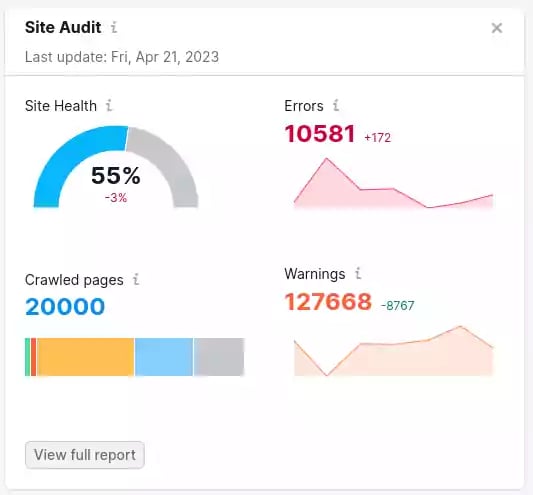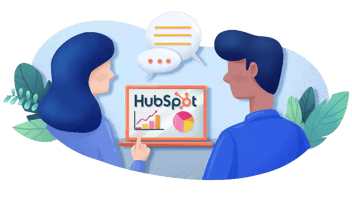Lernen Sie den HubSpot Content Hub für SEO nutzen, Rankings verbessern, den organischen Traffic erhöhen und unsere Inhalte für den Erfolg optimieren.
Steigern Sie das Wachstum Ihres Startups mit diesen 6 Marketing-Hacks
Sie haben also Ihre Marketing-Grundlagen im Griff und sind bereit, Ihr neues Unternehmen in Schwung zu bringen. Oder Sie betreten mit Ihrem bestehenden Unternehmen einen neuen Markt, eine neue Region oder eine neue Branche. Sie haben Ihre Finanzierung und einen soliden Geschäftsplan, und Ihre Mitarbeiter sind eingestellt. Jetzt ist es an der Zeit, Ihrem Marketingplan den letzten Schliff zu geben. Eine solide Grundlage ist entscheidend für Ihren Erfolg, aber wenn Sie Ihre frühe Marketingstrategie aufwerten wollen, müssen Sie sich noch mehr anstrengen.

Diese sechs Marketing-Hacks werden Ihr Startup voranbringen und Ihr Wachstum beschleunigen.
1. Pilotprojekt mit kleineren Gruppen und Nischenmärkten
Ein weites Netz auszuwerfen mag zwar für das Marketing geeignet sein, aber eine Einheitsstrategie ist ein Rezept für den Misserfolg. Experimentieren Sie bei der Entwicklung Ihrer Marketingstrategie mit Pilotgruppen und Nischenmärkten, um zu sehen, ob Sie eine oder mehrere von ihnen effektiv ansprechen können. Beginnen Sie mit den Kontakten, die Sie haben: E-Mail-Listen und Follower in den sozialen Medien sind hier Ihre besten Freunde. Eine schnelle Analyse wird Ihnen genügend Einblick geben, um einige eindeutige Nischenmärkte zu entdecken, auf die Sie sich intensiver konzentrieren können.
Beginnen Sie mit der Strategieentwicklung, sobald Sie herausgefunden haben, welche Märkte Sie ansprechen wollen. Je nachdem, an wen Sie sich wenden, können Sie verschiedene Dinge tun, um Ihr Nischenmarketing von Ihrem allgemeinen Marketing abzuheben. Wenn Sie beispielsweise eine deutlich jüngere Nische gefunden haben, können Sie Ihre Marketingsprache lockerer gestalten, um diese Zielgruppe anzusprechen.
Passen Sie außerdem die von Ihnen beworbenen Angebote und Deals auf die Nische an. Ältere Bevölkerungsgruppen sind beispielsweise eher nicht bereit, für den Versand zu zahlen. Wenn Sie einen kostenlosen Versand anbieten, können Sie einen etwas älteren Kundenstamm ansprechen.
2. Nutzen Sie Ereignisse
Beim Marketing geht es vor allem um Beständigkeit. Pünktliches Versenden der geplanten E-Mails, regelmäßige Posts in den sozialen Medien, um Kontakte an Ihre Anwesenheit zu erinnern, und aktuelle Anzeigen... das sind die Grundlagen des Marketings.
Aber wenn Sie sich nur auf konsistentes Marketing beschränken, laufen Sie Gefahr, sich zu wiederholen und, nun ja, langweilig zu werden. Natürlich wollen wir damit nicht sagen, dass Sie aufhören sollten, Ihre Marketinggrundlagen zu pflegen. Stattdessen sollten Sie das Beste aus den Marketingmöglichkeiten machen, die von Natur aus spontan und unregelmäßig sind.
Die Organisation von Marketing-Events sollte dabei Ihre erste Wahl sein. Veranstaltungen sind eine hervorragende Möglichkeit, die Aufmerksamkeit der Menschen für einen kurzen, aber intensiven Zeitraum zu gewinnen. Sie erhöhen die Sichtbarkeit und das Engagement und ermöglichen es Ihnen, mit Ihrem Publikum auf eine Weise zu interagieren, die im traditionellen Marketing nicht immer möglich ist. Der einzige Nachteil ist, dass sie wesentlich komplizierter und teurer sind als andere Marketingstrategien. Da Sie aber wahrscheinlich keine wöchentlichen Veranstaltungen durchführen werden, überwiegen die Vorteile bei weitem die Kosten.
Produkteinführungspartys sind ein guter Anfang. Sie kündigen Ihr neues Produkt bereits über E-Mail-Listen, soziale Medien und Anzeigen an, warum also nicht auch ein Event dafür veranstalten? Denken Sie daran, wie Unternehmen wie Apple jedes Jahr Veranstaltungen abhalten, um ihre neuen Produkte anzukündigen. Mittlerweile sind die Apple Events so bekannt, dass die Leute Jahr für Jahr dabei sind, auch wenn Apple in manchen Jahren nur sehr wenig anzukündigen hat. Und Sie werden nicht allzu oft neue Produkte auf den Markt bringen, so dass die Veranstaltungen jede Markteinführung zu etwas Besonderem machen.
Die Veranstaltungen müssen nicht unbedingt persönlich stattfinden. Online-Meetings und regelmäßige Webinare sind großartige, kosteneffiziente Plattformen, um Leads zu generieren und zu binden und Kunden zu schulen.
3. Fokus auf Ihre Homepage
Ihre Homepage ist eine der zuverlässigsten Schnittstellen mit Ihren Kunden. Sie ist das, was sie sehen, wenn sie wissen wollen, worum es in Ihrem Unternehmen geht. Aus diesem Grund sollten Sie so viel Zeit wie nötig aufwenden, um Ihre Homepage so gut wie möglich zu gestalten.
Denken Sie an all die verschiedenen Dinge, die eine Homepage enthalten muss: Einführungen, grundlegende Informationen zu Produkten und Kultur, Zugangslinks zu anderen Seiten und sogar Aufrufe zum Handeln. Sie müssen dafür sorgen, dass die Besucher Ihrer Homepage einen guten Eindruck von Ihrem Unternehmen bekommen, wenn sie auf Ihrer Homepage landen.
Stellen Sie sicher, dass Sie in geeignete Webdesign-Tools und -Ressourcen investieren, um über aktuelle Ressourcen zu verfügen. Diese sind in der Regel effizienter und laufen besser, was zu einem reibungsloseren Surferlebnis führt. Das Letzte, was Sie wollen, ist eine schöne Homepage, die nur langsam läuft. Vergessen Sie nicht, Weißraum und Multimedia richtig zu nutzen, um die Lesbarkeit Ihrer Seite zu verbessern.
Präsentieren Sie Ihren 30-sekündigen Elevator Pitch auf Ihrer Startseite: Welche Probleme lösen Sie, für wen und wie?
Sobald Sie die Designelemente festgelegt haben, konzentrieren Sie sich auf den Inhalt. Auch wenn Ihr Budget für das Content-Marketing anfangs gering sein wird, sollten Sie bedenken, dass Ihre Homepage mehrere Zwecke gleichzeitig erfüllen muss und gleichzeitig übersichtlich und leicht zu navigieren sein sollte.
Wenn Ihre Homepage einen guten ersten Eindruck hinterlässt, können Sie mit einem deutlichen Anstieg verschiedener Kennzahlen rechnen, z. B. der Anmeldungen für die E-Mail-Liste, der Konversionsraten und der Verweildauer auf der Website.
4. Bringen Sie Ihre grundlegende, technische SEO in Form
Einige häufige Fehler, die durch technische SEO behoben werden können, sind:
-
Website-Geschwindigkeit: Optimieren Sie die Geschwindigkeit der Website, indem Sie die Reaktionszeit des Servers verbessern, die Größe von Bildern und anderen Medien reduzieren und Caching- und Komprimierungstechniken einsetzen.
-
Duplizierter Inhalt: Identifizieren und beheben Sie Probleme mit doppelten Inhalten auf einer Website, die Suchmaschinen verwirren und zu niedrigeren Suchergebnissen führen können.
-
Defekte Links: Defekte Links wirken sich negativ auf die Benutzerfreundlichkeit und die Platzierung in Suchmaschinen aus.
Auch interessant?
-
Weiterleitungen: Stellen Sie sicher, dass Weiterleitungen korrekt implementiert sind, und vermeiden Sie Weiterleitungsketten, die sich negativ auf die Geschwindigkeit der Website und die Platzierung in Suchmaschinen auswirken können.
-
XML-Sitemap: Stellen Sie sicher, dass eine XML-Sitemap erstellt und an die Suchmaschinen übermittelt wird, damit die Suchmaschinen Ihre Website effektiver crawlen und indexieren können.
-
Mobile Reaktionsfähigkeit: Eine Website muss sich nahtlos an verschiedene Bildschirmgrößen und Geräte anpassen, was für die Benutzerfreundlichkeit und die Platzierung in Suchmaschinen unerlässlich ist.
Das ist nicht in Ordnung:
5. Schaffen Sie ein Gefühl der Dringlichkeit - nutzen Sie FOMO
Die Angst, etwas zu verpassen (FOMO), ist ein natürlicher Teil der menschlichen Psychologie, und Sie sollten sicherstellen, dass Sie sie in Ihrer Marketingstrategie so weit wie möglich ausnutzen. Bei FOMO geht es darum, dass wir nicht von Aktivitäten, Veranstaltungen und Erfahrungen ausgeschlossen werden wollen, an denen andere Menschen teilnehmen.
Im Marketing kann FOMO leicht für zeitkritische Dinge wie Verkäufe, Produktveröffentlichungen in limitierter Auflage, Tests und Demos genutzt werden. Wenn Sie ein Gefühl der Exklusivität rund um Ihr Unternehmen und seine Produkte schaffen, werden Sie mehr Besucher und eifrigere Kunden bemerken, die sich Ihnen nähern.
Viele Strategien konzentrieren sich auf FOMO, also müssen Sie diejenige finden, die für Ihr Unternehmen, Ihr Produkt und Ihren Kundenstamm am besten geeignet ist. Hier sind einige allgemeine Beispiele für FOMO-basierte Strategien:
-
Wenn Sie ein physisches Produkt verkaufen, bringen Sie einzigartige Versionen in limitierter Auflage heraus. Die am meisten interessierten Kunden erhalten das exklusivere Produkt gegen einen kleinen Aufpreis.
-
Wenn Sie ein Softwareprodukt verkaufen, können Sie eine frühe, exklusive Beta-Version einrichten, um das Produkt zu testen und die Vorfreude auf die Vollversion zu steigern.
-
Wenn Sie eine Dienstleistung verkaufen, können Sie Probezeiträume anbieten, damit die Nutzer die Dienstleistung ausprobieren können, ohne anfangs zu viel Geld auszugeben.
6. Nutzen Sie die FAQs
Wenn Sie Ihre Website besuchen, werden die Nutzer immer Fragen haben. Angesichts der aktuellen Praktiken im Bereich des Webdesigns können Sie nur eine bestimmte Menge an Informationen auf einer Seite unterbringen, bevor sie zu unübersichtlich wird. Sie werden also nicht alle Fragen Ihrer Besucher auf natürliche Weise beantworten können.
In solchen Fällen ist ein FAQ-Bereich eine gute Ergänzung zu Ihrer Website. FAQs eignen sich hervorragend, um Fragen zu stellen, die so relevant sind, dass sie eine Antwort erfordern, aber Sie konnten keine Möglichkeit finden, die Antworten organisch in Ihre Website zu integrieren. FAQs sind großartig, weil sie nicht besonders organisiert sein müssen. Alles, was Sie brauchen, ist eine Liste von Fragen und deren Antworten. Sie können sie gestalten und stilisieren, wenn Sie das möchten, aber das ist überhaupt nicht notwendig. Sie brauchen die Fragen auch nicht besonders zu organisieren. Sie können Fragen zu allen Bereichen Ihres Unternehmens und Ihrer Website mischen, ohne dass dies der Benutzerfreundlichkeit schadet.
Der beste Weg, um herauszufinden, welche Fragen in Ihren FAQ beantwortet werden sollten, ist, Ihren Interessenten und Kunden zuzuhören. Wenn Sie keine einfachen Möglichkeiten haben, mit ihnen zu kommunizieren, können Sie immer Ihre Vertriebs- oder Kundendienstabteilungen fragen, um zu sehen, welche Fragen sie zu beantworten haben.
Sind Sie bereit, Ihr Geschäft auszubauen?
Wenn Sie sich an Ihre Grundlagen halten und diese mit den kleinen Hacks, die wir hier für Sie aufgelistet haben, umsetzen, werden Sie in der Tat Erfolge bei den Besucherzahlen und den Verkäufen spüren. Vergessen Sie aber nicht, dass diese Liste nicht vollständig ist und es noch viel mehr in Sachen Marketing zu entdecken gibt.
This content is also available in:
- English: Boost Your Startup's Growth with These 6 Marketing Hacks
- Español: Impulsa el crecimiento de tu startup con estos 6 trucos de marketing
- Français: 6 Astuces Marketing pour Booster la Croissance de Votre Startup
- Italiano: 6 trucchi di marketing essenziali per la crescita della tua startup
- Română: Stimulați creșterea start-up-ului cu aceste 6 trucuri de marketing
- 简体中文: 用这 6 个营销技巧促进初创企业成长
.jpg?width=120&height=120&name=Max%20%26%20Katharina%20(756%20of%20786).jpg)
Joachim, ein zertifizierter HubSpot-Trainer mit über 13 Jahren Erfahrung in Content-Marketing, Strategie, Website-Entwicklung und SEO, hat zahlreiche große, internationale Growth-Marketing-Projekte umgesetzt, z. B. mit UiPath vom Startup-Status bis zum Börsengang an der NYSE. Joachim verfügt über besondere Expertise in mehrsprachigen Marketing- und Sales-Enablement-Projekten und nutzt dabei für unsere Kunden modernste KI-Technologien.


.jpg?width=100&height=100&name=Max%20%26%20Katharina%20(756%20of%20786).jpg)









Kommentar hinterlassen